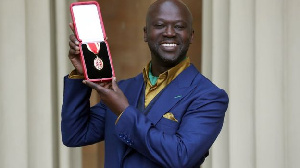Sir David Adjaye, architect of the National Cathedral of Ghana project has been accused of sexual impropriety by three Black women he previously worked with.
Whiles Adjaye admitted to having previously been in relationships with the accusers he told journalists that they were all on consensual basis.
The Financial Times magazine’s Investigations wing published the story on July 4 in a long-form piece titled: “Sir David Adjaye: the celebrated architect accused of sexual misconduct.”
The story essentially centered on the three women narrating the allegations during their time with Adjaye citing instances of sexual assault to harassment.
A lawyer for Adjaye said that the three women each had “their own grievances” against Adjaye, the report added.
In response to questions about allegations made by the three women, Adjaye said: “I absolutely reject any claims of sexual misconduct, abuse or criminal wrongdoing. These allegations are untrue, distressing for me and my family and run counter to everything I stand for.”
He added: “I am ashamed to say that I entered into relationships which though entirely consensual, blurred the boundaries between my professional and personal lives. I am deeply sorry. To restore trust and accountability, I will be immediately seeking professional help in order to learn from these mistakes to ensure that they never happen again.”
Profile of the three women
The three women say their dealings with Adjaye have disrupted their careers, left them in precarious financial circumstances and caused them serious mental distress.
The women, who requested their names be changed, share common characteristics. They were all black women in their forties at the time the alleged abuse occurred, and are single mothers, well-connected professionally and from influential families.
All three women knew Adjaye before their employment and had friends and acquaintances in common with him.
They said they felt compelled to come forward about their experiences in order to prevent other women from encountering similar abuse and to make public the architect’s private behaviour.
In all three cases the Financial Times has worked to corroborate their accounts by interviewing colleagues, family members and friends who were confided in by the women, as well as reviewing contemporaneous emails, documents and text messages.
 Home Of Ghana News Ghana News, Entertainment And More
Home Of Ghana News Ghana News, Entertainment And More




